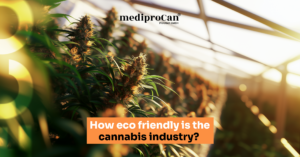Nachrichten
Nachrichten und aktuelle Informationen auf einen Blick
The Eco-Friendliness of Cannabis Cultivation:
A Closer Look

As the cannabis industry is growing at such a rapid pace at the moment – all around the world, discussions about its environmental impact have become increasingly important. While some advocate for cannabis as an eco-friendly crop, the truth is more nuanced. Let’s dig deeper into the environmental implications of cannabis cultivation, explore its sustainability, and consider ways to make it greener.
The Positive Aspects
- Carbon Sequestration: Like other plants, cannabis absorbs carbon dioxide from the atmosphere, contributing to carbon sequestration. This process can help mitigate climate change, particularly when grown in outdoor settings where plants can flourish naturally.
- Low Water Usage: When cultivated outdoors in the right climate, cannabis can be less water-intensive than many traditional crops. Organic practices can further enhance water conservation efforts.
- Natural Pest Resistance: Cannabis is relatively resilient against pests and diseases, especially when grown organically. This resilience can reduce the need for chemical pesticides, promoting a healthier ecosystem.
- Soil Health: Sustainable cultivation methods, such as crop rotation and cover cropping, can enhance soil fertility and biodiversity, contributing to healthier ecosystems.
The Negative Impacts
Despite these positives, cannabis cultivation can have significant environmental drawbacks:
- Energy Consumption: Indoor cultivation, often necessary in regions with restrictive climates or regulations, requires substantial energy for lighting, heating, and ventilation. This can lead to a significant carbon footprint.
- Water Usage: While outdoor cultivation can be efficient, indoor growing often leads to excessive water usage. Hydroponic systems can use large amounts of water, especially if not managed properly.
- Land Use and Deforestation: Illegal outdoor cultivation can lead to deforestation and habitat destruction, particularly in sensitive ecosystems. This is exacerbated when growers prioritise land access over environmental stewardship.
- Chemical Use: Though many growers avoid pesticides, some still rely on chemical fertilisers and pesticides that can harm local wildlife and ecosystems.
Moving Toward Greener Cannabis Cultivation
If cannabis cultivation has environmental drawbacks, what steps can be taken to make it more eco-friendly?
- Embrace Sustainable Practices
– Organic Farming: Prioritising organic cultivation methods helps minimise chemical usage, promoting healthier soil and ecosystems. Organic fertilisers, composting, and integrated pest management can enhance sustainability.
– **Permaculture Techniques**: Implementing permaculture principles, such as biodiversity and natural resource management, can create resilient growing systems that work with nature rather than against it.
- Optimise Indoor Cultivation
– Energy Efficiency: Growers can invest in energy-efficient lighting and climate control systems to reduce energy consumption. LED lights, for instance, consume less power and have a longer lifespan than traditional lighting.
– Renewable Energy Sources: Using solar, wind, or other renewable energy sources can significantly reduce the carbon footprint of indoor operations.
- Water Conservation Techniques
– Smart Irrigation: Employing drip irrigation systems or rainwater harvesting can help optimise water use, reducing waste and promoting sustainability.
– Monitoring Systems: Utilising technology to monitor soil moisture levels can prevent over-watering and help growers make informed decisions about irrigation.
- Advocate for Responsible Land Use
– Permitted Cultivation: Supporting legal and regulated cultivation can help minimise the environmental impact associated with illegal grows, which often lead to habitat destruction and pollution.
– Community Engagement: Encouraging local communities to participate in sustainable practices can foster a collective approach to environmental stewardship in cannabis cultivation.
Cannabis cultivation presents a complex picture of environmental impact. While there are aspects that can be considered eco-friendly, significant challenges remain. The key to a more sustainable future lies in embracing innovative practices, prioritising organic methods, and adopting energy-efficient technologies.
By fostering a commitment to environmental stewardship, the cannabis industry can enhance its sustainability and contribute positively to our planet. As consumers, advocating for eco-friendly products and supporting responsible cultivation practices can drive change, making cannabis a greener choice for everyone.
Follow mediproCan instagram

